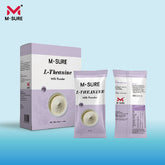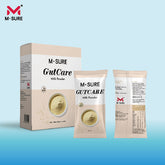Why DHA Is Essential for Children’s Health and Development
by
BiotechAusway
10 Apr 2025
Docosahexaenoic acid (DHA), an omega-3 fatty acid, plays a crucial role in children's physical and cognitive development. As a primary structural component of the brain and retina, DHA supports lifelong health from infancy through adolescence.
1. Builds Brain Structure and Function
Early Brain Development
-
DHA makes up to 25% of the brain’s fatty acids.
-
It is vital for forming neural connections and myelin sheaths (nerve insulation).
-
Rapid brain growth in the first two years relies on DHA from breast milk, formula, or food.
Cognitive Performance
-
Higher DHA levels are linked to better memory, attention, and problem-solving.
-
A 2020 trial found DHA supplements improved reading scores in underperforming children.
2. Supports Vision and Eye Health
-
DHA is a key component of the retina, supporting visual sharpness and color perception.
-
Infants fed DHA-fortified formula show better visual acuity.
-
Low DHA levels are associated with increased digital eye strain in screen-exposed children.
3. Enhances Learning and Behavior
-
DHA supports neurotransmitter function, enhancing brain cell communication.
-
Important for language development and emotional regulation.
-
Children with ADHD or learning difficulties often have lower omega-3 levels.
-
Supplementation may reduce hyperactivity and improve focus.
4. Addresses Dietary Gaps
Modern Diet Shortfalls
-
Many children consume little fatty fish (salmon, mackerel), the main natural DHA source.
-
Diets high in processed foods lead to omega-3 deficiencies.
Vegetarian and Vegan Diets
-
Plant-based sources (like algae and flaxseed) offer limited DHA.
-
Supplements or fortified foods are often necessary.
5. Boosts Immune and Long-Term Health
-
DHA reduces inflammation, helping lower the risk of allergies and asthma.
-
Early DHA intake is linked to better cholesterol levels and reduced adult cardiovascular risk.
6. Special Needs for High-Risk Groups
Premature Infants
-
Preemies miss the final trimester transfer of DHA from mother to baby.
-
They may need fortified milk or supplements to support development.
Picky Eaters
-
Limited dietary variety can result in low DHA intake.
-
Supplementation may be necessary to meet daily needs.






